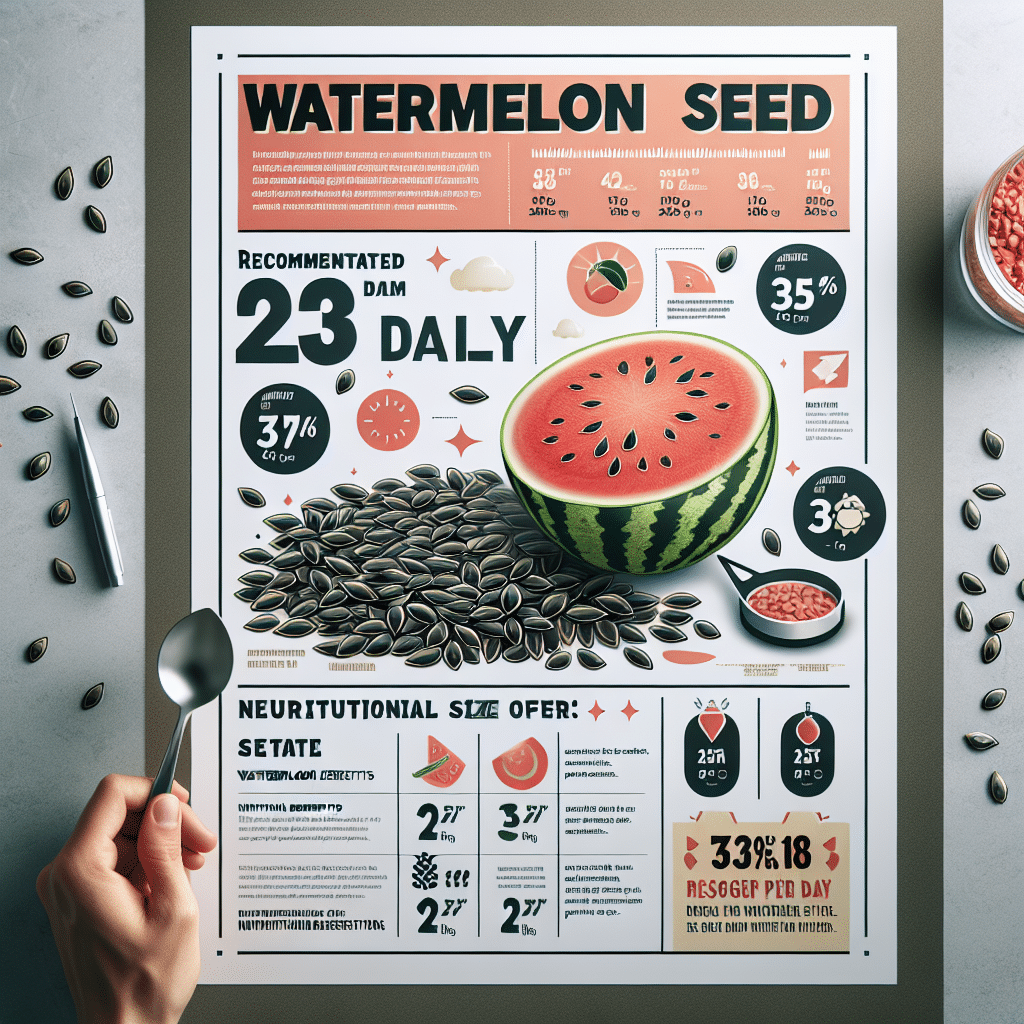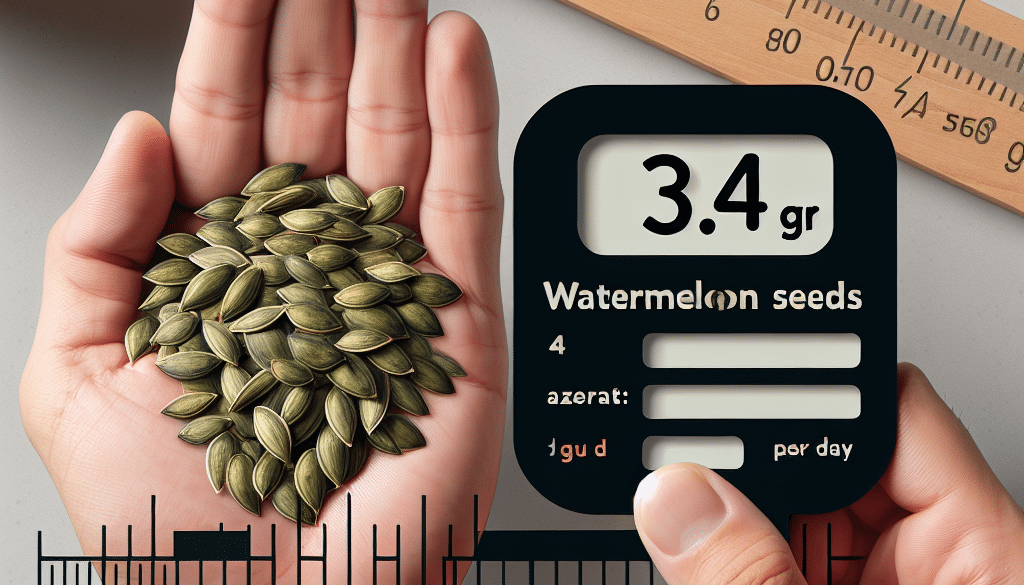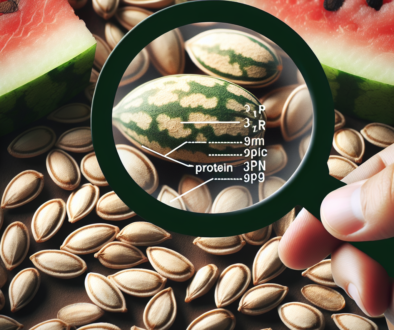How Many Grams Of Watermelon Seeds Should I Eat A Day?
-
Table of Contents
- Optimal Daily Intake of Watermelon Seeds for Health Benefits
- Understanding Watermelon Seeds
- Recommended Daily Intake of Watermelon Seeds
- Health Benefits of Watermelon Seeds
- How to Incorporate Watermelon Seeds into Your Diet
- Potential Risks and Considerations
- Case Studies and Research
- Conclusion: Balancing Nutrient Intake with Watermelon Seeds
- Discover ETprotein’s Watermelon Seed Protein Products
Optimal Daily Intake of Watermelon Seeds for Health Benefits

Watermelon seeds are often overlooked as a nutritious snack, but they are packed with essential vitamins, minerals, and fatty acids. Understanding the optimal daily intake of these seeds can help you incorporate them into your diet effectively. This article will explore the benefits of watermelon seeds, how many grams you should eat a day, and why they might be a valuable addition to your diet.
Understanding Watermelon Seeds
Before diving into the specifics of daily intake, it’s important to understand what watermelon seeds offer nutritionally. These tiny seeds are a powerhouse of nutrients, including magnesium, iron, and zinc. They also contain good amounts of protein and heart-healthy fats. Additionally, watermelon seeds are a source of dietary fiber, which is beneficial for digestive health.
Recommended Daily Intake of Watermelon Seeds
When it comes to the recommended daily intake of watermelon seeds, moderation is key. While they are nutritious, they are also calorie-dense. A general guideline is to consume about 30 grams of watermelon seeds per day. This amount provides a good balance of nutrients without adding excessive calories to your diet.
- Magnesium: A 30-gram serving of watermelon seeds provides approximately 139 mg of magnesium, which is about 35% of the recommended daily intake for adults.
- Iron: This serving size also contains about 2.29 mg of iron, contributing to 11-29% of the recommended daily intake, depending on the individual’s age and gender.
- Zinc: With 1.02 mg of zinc per 30 grams, watermelon seeds can help meet 9-13% of your daily zinc requirement.
It’s important to note that these values can vary based on the preparation method and the variety of the watermelon seeds.
Health Benefits of Watermelon Seeds
Eating watermelon seeds in the recommended amounts can offer several health benefits:
- Heart Health: The magnesium in watermelon seeds can help regulate blood pressure and enhance heart health.
- Bone Strength: Minerals like magnesium and zinc contribute to bone density and strength.
- Immune Support: Zinc plays a crucial role in immune system function.
- Metabolic Boost: The protein content in watermelon seeds can help in muscle building and metabolism.
How to Incorporate Watermelon Seeds into Your Diet
Incorporating watermelon seeds into your diet is simple. Here are some ideas:
- Snack on roasted watermelon seeds instead of less healthy options.
- Add them to salads for a crunchy texture.
- Blend them into smoothies for an extra nutrient boost.
- Use ground watermelon seeds as a gluten-free flour alternative in baking.
Remember to choose unsalted and unflavored varieties to keep your sodium intake in check and avoid added sugars.
Potential Risks and Considerations
While watermelon seeds are generally safe for consumption, there are a few considerations to keep in mind:
- Caloric Content: Watermelon seeds are high in calories, so it’s important to stick to the recommended serving size.
- Allergies: Some individuals may be allergic to watermelon seeds. If you experience any adverse reactions, discontinue use immediately.
- Choking Hazard: Whole seeds can be a choking hazard, especially for children. Ensure they are chewed thoroughly or ground before consumption.
Case Studies and Research
Several studies have highlighted the benefits of consuming seeds, including watermelon seeds. For instance, research published in the International Journal of Nutrition and Food Sciences suggests that watermelon seeds are a rich source of nutrients and have potential health benefits when included in the diet.
Another study in the Journal of Agricultural and Food Chemistry found that watermelon seed oil is rich in unsaturated fatty acids, which are beneficial for heart health.
Conclusion: Balancing Nutrient Intake with Watermelon Seeds
In conclusion, watermelon seeds are a nutritious snack that can offer a variety of health benefits when consumed in moderation. A daily intake of around 30 grams is recommended to balance nutrient intake without overindulging in calories. By incorporating watermelon seeds into your diet, you can enjoy their health-promoting properties while adding a delightful crunch to your meals.
Discover ETprotein’s Watermelon Seed Protein Products
If you’re looking to incorporate watermelon seed protein into your diet, ETprotein offers high-quality watermelon seed protein products. Their watermelon seed protein is characterized by a neutral taste, non-GMO, and allergen-free attributes, making it an excellent choice for those seeking plant-based protein sources. ETprotein’s commitment to quality ensures that you receive a product that is not only nutritious but also meets the highest standards of purity and efficacy.
About ETprotein:
ETprotein, a reputable protein and L-(+)-Ergothioneine (EGT) Chinese factory manufacturer and supplier, is renowned for producing, stocking, exporting, and delivering the highest quality organic bulk vegan proteins and L-(+)-Ergothioneine. They include Organic rice protein, clear rice protein, pea protein, clear pea protein, watermelon seed protein, pumpkin seed protein, sunflower seed protein, mung bean protein, peanut protein, and L-(+)-Ergothioneine EGT Pharmaceutical grade, L-(+)-Ergothioneine EGT food grade, L-(+)-Ergothioneine EGT cosmetic grade, L-(+)-Ergothioneine EGT reference grade and L-(+)-Ergothioneine EGT standard. Their offerings, characterized by a neutral taste, non-GMO, allergen-free attributes, with L-(+)-Ergothioneine purity over 98%, 99%, cater to a diverse range of industries. They serve nutraceutical, pharmaceutical, cosmeceutical, veterinary, as well as food and beverage finished product distributors, traders, and manufacturers across Europe, USA, Canada, Australia, Thailand, Japan, Korea, Brazil, and Chile, among others.
ETprotein specialization includes exporting and delivering tailor-made protein powder and finished nutritional supplements. Their extensive product range covers sectors like Food and Beverage, Sports Nutrition, Weight Management, Dietary Supplements, Health and Wellness Products, and Infant Formula, ensuring comprehensive solutions to meet all your protein needs.
As a trusted company by leading global food and beverage brands and Fortune 500 companies, ETprotein reinforces China’s reputation in the global arena. For more information or to sample their products, please contact them and email sales(at)ETprotein.com today.














